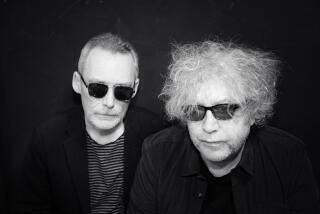POP MUSIC : 10 ESSENTIAL INDUSTRIAL ALBUMS
- Share via
Lou Reed, “Metal Machine Music” (1975). This double-LP set of pure, clanky mechanical hum was widely considered a joke when RCA put it out--even, from all reports, by Reed himself--but has become, as they say, “seminal,” the grandfather of the genre. It’s even been reissued on CD!
Throbbing Gristle, “Twenty Jazz Funk Greats” (1979). Grinning industrial ugliness has a shotgun wedding with bouncy pop and bears a two-headed love child that is simultaneously fascinating and too horrible to behold. The true precursor to industrial music.
Swans, “Cop” (1984). Before it turned into a pretty-music wallpaper band, the Swans used to sing about brutality and dominance the way that Springsteen sings about cars ‘n’ bars, and its sound resembled what would happen if you put a tin bucket over your head and had someone bang on it with a pipe wrench. This is, oddly enough, a recommendation.
Einsturzende Neubauten, “Strategies Against Architecture” (1984). Some people consider the early experiments conducted by this Berlin-based ensemble, mostly involving piercingly distorted guitar and battered machinery, to be the peak of the capital “I” industrial thing, and certainly rock ‘n’ roll alienation has never been more persuasively expressed than in this compilation.
Laibach, “Opus Dei” (1987). Leading members of the cultural arm of the newly independent republic of Slovenia--we’re not making this up--Laibach plays up the fascistic qualities that have always been inherent in disco and beats you over the head with them. The highlight here is a powerful, martial version of the lightweight dance tune “Life Is Life” blown up to positively Wagnerian proportions.
Head of David, “Dustbowl” (1988). This is basically the recording that introduced death disco to heavy-metal-riff guitar (singer Justin Broadrick was also a founding member of grindcore band Napalm Death and went on to form grind/industrial band Godflesh), and as such was surely one of the most avidly studied obscure albums of the late ‘80s. Though it probably sold only a few hundred copies in the United States, you can hear echoes of “Dustbowl” in everything from Ministry to Nine Inch Nails.
Skinny Puppy, “Rabies” (1989). Working in a style that the unfeeling compare to deconstructed Depeche Mode, Skinny Puppy’s Nivek Ogre is poppy where a lot of his peers are brutal, intense instead of over-the-top insane. You could even call a Skinny Puppy album pretty, at least in a moody sort of way. “Rabies” is a collaboration, more or less, with Ministry’s inevitable Alain Jourgensen, and though slightly atypical of the Skinny Puppy oeuvre , “Rabies” also rocks a little harder.
Revolting Cocks, “Beers, Steers + Queers” (1990). Industrial disco reincarnated as rock ‘n’ roll, complete with abusive, throat-cancer vocals, whomping 10-ton beats and wailing post-punk guitar, this Jourgensen-produced masterpiece is just the tape to blast from your car late at night if you want to annoy the hell out of your neighbors. Revolting Cocks also takes itself a lot less seriously than most industrial groups.
Ministry, “In Case You Didn’t Feel Like Showing Up” (1990). Because industrial music is by nature distorted and shrieky, live industrial music is even better because it’s more distorted and shriekier. This album, sort of a Ministry’s greatest-hits EP performed live on tour by a multipiece all-star band--two of everything; more whomp for your record-buying dollar--is the essential document of industrial’s most essential band.
Nine Inch Nails, “Pretty Hate Machine” (1989). What Robert Plant was to post-blues screech and Nirvana’s Kurt Cobain is to Northwest grunge, Nine Inch Nails’ Trent Reznor is to the tortured-man death-disco howl, palpable pain expressed as rock ‘n’ roll. If anybody could possibly stretch the genre to the point where it appeals to people other than sad teen-agers who drive Rabbit convertibles, Reznor is the guy.
More to Read
The biggest entertainment stories
Get our big stories about Hollywood, film, television, music, arts, culture and more right in your inbox as soon as they publish.
You may occasionally receive promotional content from the Los Angeles Times.











